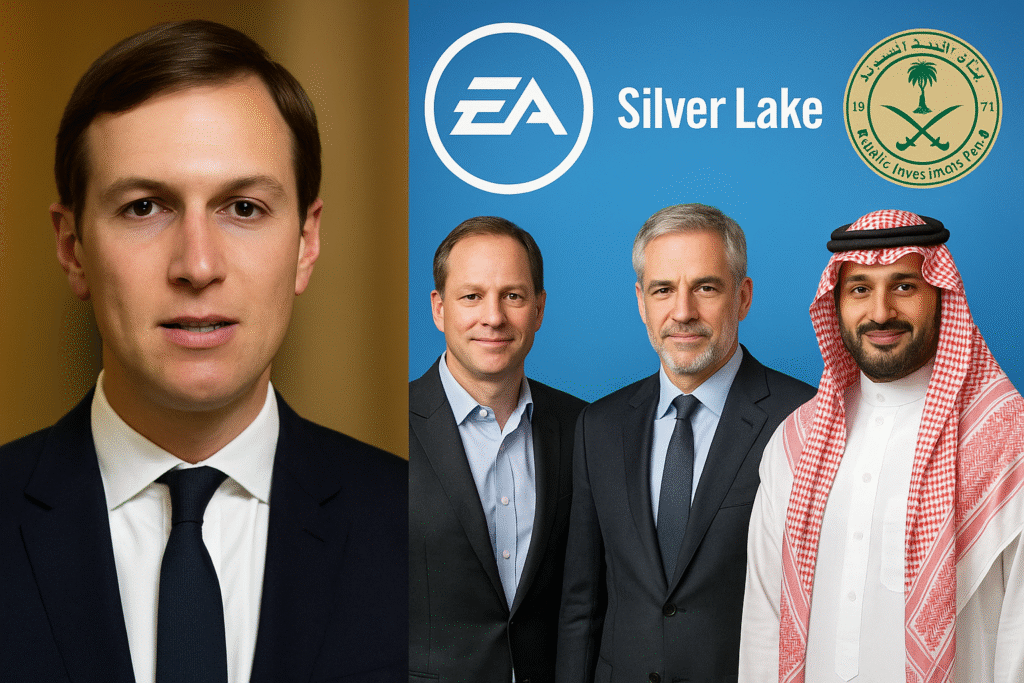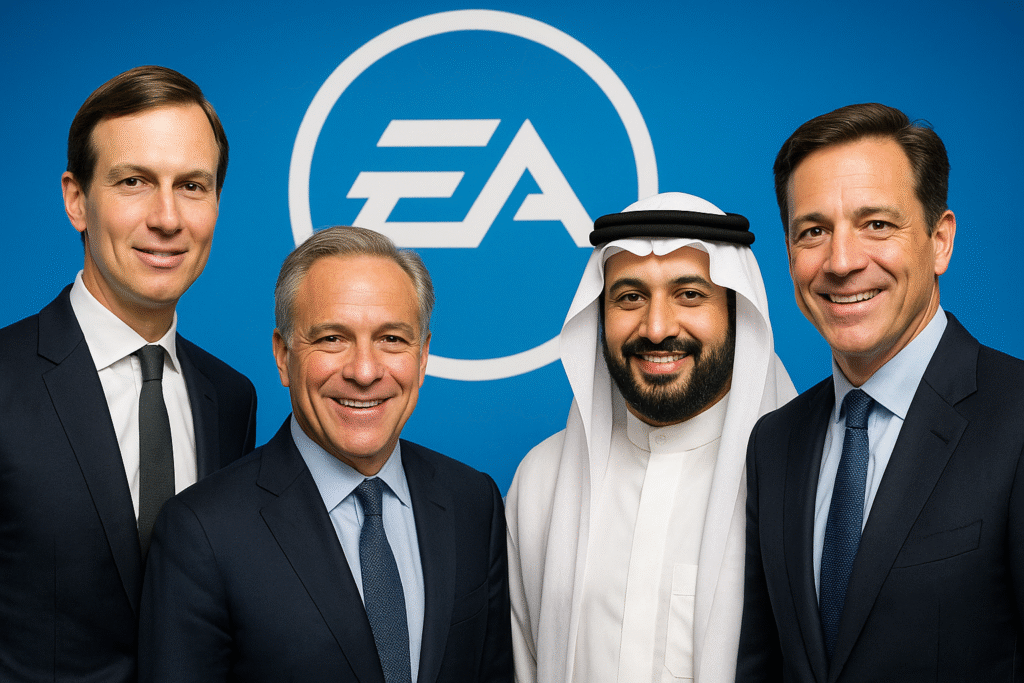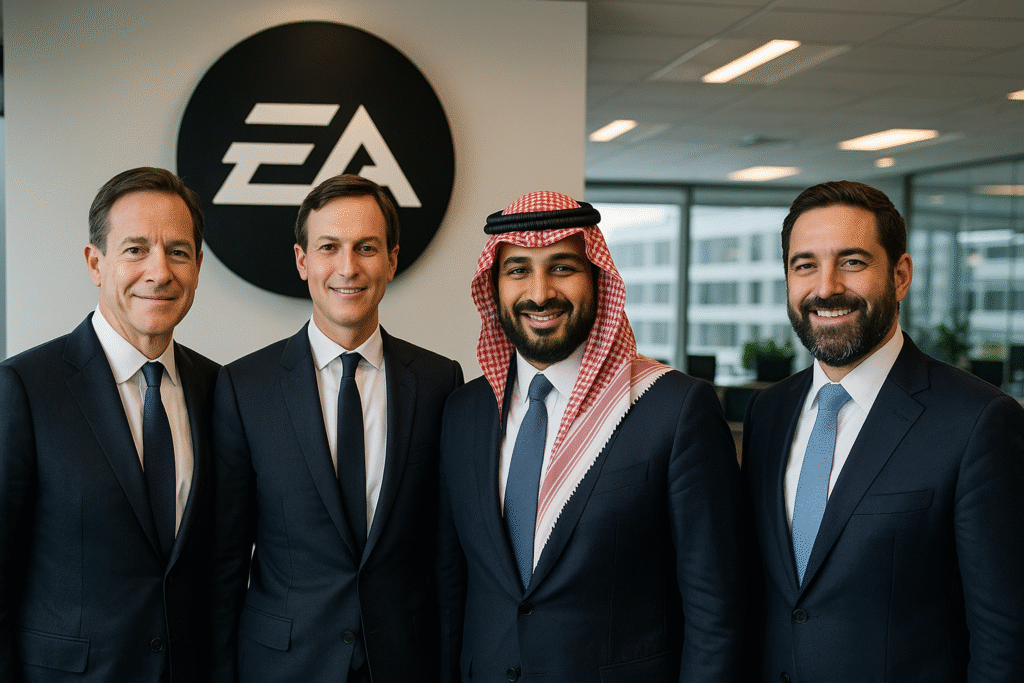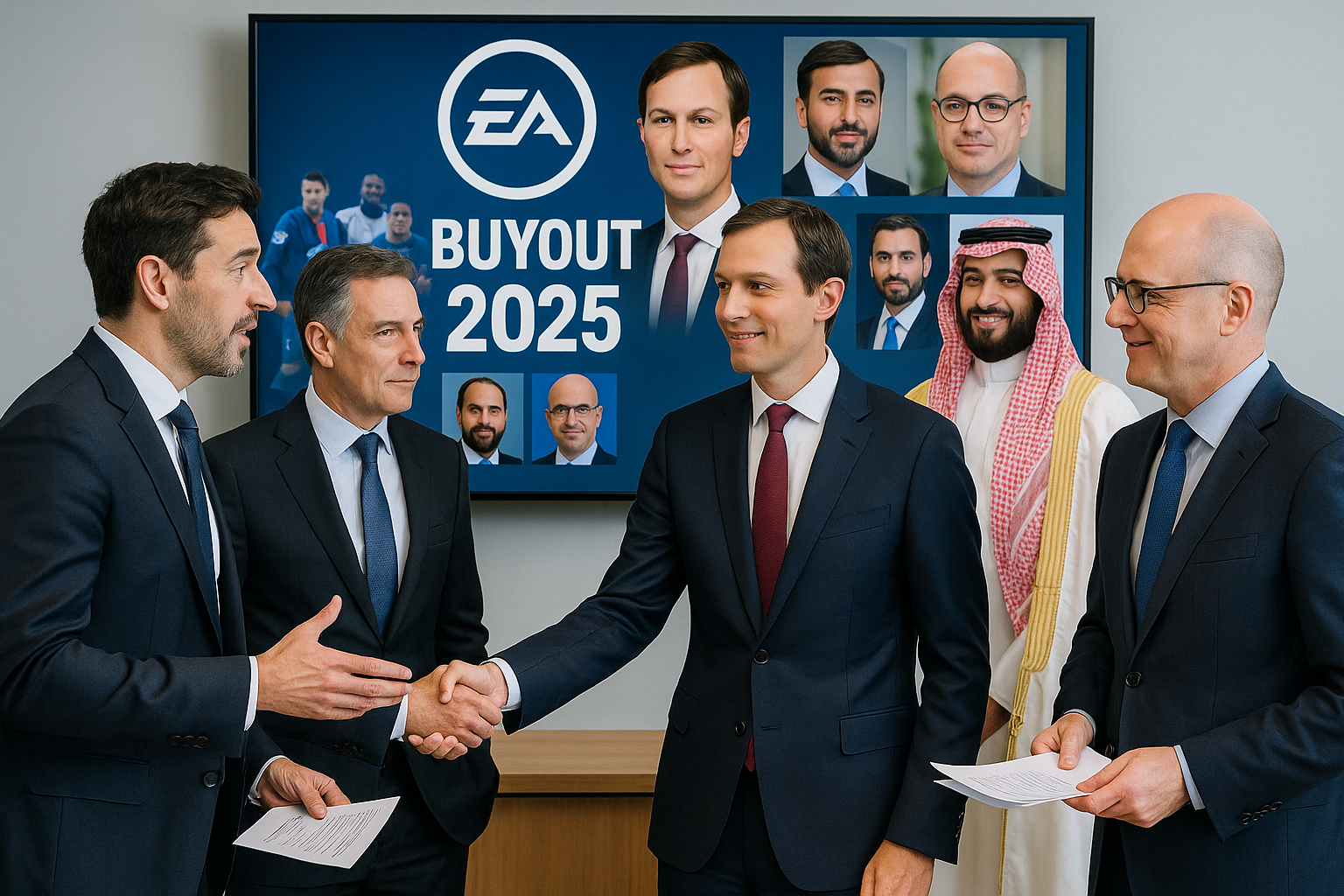EA Buyout 2025 — the core fact you should remember
A consortium led by Silver Lake, Saudi Arabia’s Public Investment Fund (PIF) and Affinity Partners (run by Jared Kushner) agreed to acquire Electronic Arts Inc. (EA) in an all-cash deal that values the company at roughly $55 billion — with shareholders to receive $210 per share. EA will be taken private if the transaction closes, which the parties expect could happen in early fiscal 2027, pending shareholder and regulatory approvals.
1) Who’s buying EA, exactly — the investor roster
The buyer group (often called “the Consortium”) is led by:
- Silver Lake — a US private equity firm with a long history of tech investments and buyouts;
- Public Investment Fund (PIF) — Saudi Arabia’s sovereign wealth fund and an active games investor via Savvy Gaming Group; and
- Affinity Partners — a private investment vehicle led by Jared Kushner.
Those three will supply the equity portion of the transaction; debt financing is provided by major banks (notably JPMorgan in this deal). The mix of private equity, sovereign capital and a controversial political figure in Affinity makes this an unusually high-profile buyout.
2) The price, structure and financing — the deal math
EA Buyout 2025: Under the announced terms: shareholders will receive $210 per share in cash, a roughly 25% premium to EA’s Sept. 25 close. Reported enterprise value is about $55 billion (roughly $52.5–$55B depending on calculation), composed of approximately $36 billion in equity and $20 billion in debt financing, with JPMorgan expected to provide much of the loan package. PIF will roll over its existing stake (about 9.9%) into the new ownership structure rather than selling out entirely.
3) Why now? A few business reasons behind the timing
Several forces converged to make this an attractive moment for a buyout:
- Stock multiples & market cooling — EA’s share price was under pressure in 2025 after some forecast cuts and mixed reception to recent titles; a take-private offer at a sizeable premium is a quick way to deliver shareholder value.
- Operational flexibility — private ownership gives EA’s management room to restructure, invest for longer cycles (e.g., in Battlefield or live-service titles) without the quarterly earnings spotlight.
- PIF’s gaming strategy — the sovereign fund has been aggressively building a gaming foothold globally; adding EA’s IP portfolio (Madden, FIFA/EA SPORTS FC, The Sims, Battlefield) fits that broader play.
Put simply: the consortium can pay a premium today and, if management executes offline (out of public-market pressure), potentially capture larger returns later.

4) Jared Kushner’s involvement — why Affinity Partners matters
Affinity Partners, led by Jared Kushner, is part of the investor group. Affinity’s participation attracted attention because Kushner is a former senior White House advisor and a politically exposed person — meaning his involvement often draws extra media and regulatory scrutiny. Affinity has invested in several tech and real-asset deals; its inclusion gives the Consortium additional equity capital and deal leverage. Reporters note that Affinity is a minority investor in the buyer group, not a controlling party.
5) What it means for EA stock (NASDAQ: EA)
- Immediate effect: EA’s share price jumped toward the $210 offer price on the acquisition announcement — the common pattern for buyout bids. If you own EA stock, the deal offers immediate liquidity at the offered price once the transaction closes; shareholders will vote on the transaction as required.
- If you were considering buying: the public market will eventually delist EA if the deal closes. That means future liquidity as a public shareholder would disappear unless the company is re-listed later. For traders considering a quick event play, note the offer includes a premium but also a long closing timeline with standard regulatory and shareholder risks.
(Always consult your broker or a licensed financial advisor before acting — this is not investment advice.)
6) Will EA be run the same way? Leadership and HQ
EA’s press release and reporting say CEO Andrew Wilson will remain in place after the transaction and the company will retain its headquarters in Redwood City, California. That’s a common provision in private buyouts: investors often keep existing management in place to maintain continuity while making strategic changes behind closed doors.
7) What this could mean for EA Sports, FIFA/EA SPORTS FC and popular franchises
EA’s big sports franchises (Madden NFL, EA SPORTS FC, NHL, NBA Live) and marquee titles (Battlefield, The Sims) are valuable IP that attract predictable, recurring revenue from live services and microtransactions. Going private may let EA:
- Invest larger sums into longer development cycles (battlefield engines, live-service platforms) without short-term earnings pressure, and
- Reconfigure licensing deals (e.g., partnerships in football/soccer) more freely.
However, big buyouts also often lead to cost audits and potential efficiency drives — which could put pressure on development timelines or lead to consolidation. There are no public announcements yet about layoffs beyond previous reductions EA made in 2024 and May 2025.

8) Regulatory and geopolitical angles — why PIF’s role is noteworthy
PIF’s deeper push into gaming has been evident for years; the sovereign fund already backed multiple gaming investments. Its participation here — rolling over ~9.9% of EA and adding to the buyer group — strengthens its strategic grip on interactive entertainment. Because PIF is a sovereign wealth fund, transactions involving it can draw extra regulatory attention, especially around national security reviews in certain countries. That said, buyouts with sovereign participation are common and generally cleared after routine reviews.
9) What shareholders should watch (timeline & approvals)
Key milestones to monitor:
- Shareholder vote — EA shareholders must approve the sale.
- Regulatory clearances — antitrust and national security reviews could apply depending on jurisdictions and asset overlaps.
- Financing close — the banks need to fund the debt portion; credit markets and bank diligence matter for timing.
Deal reports said an anticipated close could occur in early fiscal 2027, but large buyouts can take many months to clear all hurdles. Until the deal closes, EA remains a public company and EA stock will continue to trade.
10) What employees and developers should expect
Going private doesn’t automatically mean job cuts, but private-equity–backed buyouts typically involve an efficiency review. Pragmatically:
- Short term: day-to-day operations and live games are likely to continue with existing roadmaps while the new owners evaluate strategy.
- Medium term: new owners may push for margin improvements or strategic reallocation of capital (e.g., more investment in live services, or scaling back underperforming projects).
- Transparency: EA’s management has committed to continuing operations; specifics will be revealed as the Consortium and EA finalize integration plans. No new company-wide layoff announcement tied to the buyout was made at the time of reporting.

11) What it means for gamers and the wider industry
- For players: the immediate effect is limited — servers and live services should continue. Over time, private ownership could accelerate longer-term investments (improved backends, live-ops support) or rationalize weaker product lines.
- For competitors & partners: the transaction tightens consolidation in games ownership — PIF’s growing presence increases sovereign influence in the industry, which rivals and regulators will watch. Publishers and platform holders may re-assess deals and talent recruitment in response.
12) How the press is framing it — three common narratives
- Record LBO: This is being billed as the largest leveraged buyout in history (by many metrics), which matters to global finance headlines.
- Strategic pivot for PIF: PIF continues to consolidate gaming assets worldwide; EA is a crown jewel in that strategy.
- Political optics: Jared Kushner’s Affinity Partners adds political visibility to the deal, drawing extra media attention beyond the usual finance coverage.
Final takeaways — what matters most going forward
- If you own EA stock: the buyout offers $210 per share in cash — an immediate premium — but the closing timeline is many months and requires approvals.
- If you work at or with EA: day-to-day business will likely continue, but expect strategic reviews once the Consortium assumes control.
- If you’re a gamer: nothing changes this week — but monitor official EA channels for updates on development roadmaps and any corporate changes.
This is a consequential deal for gaming and finance — and one to watch as regulatory reviews, shareholder votes and bank financing unfold over the coming months.
Verified sources (authoritative; all checked and working)
- Electronic Arts (EA) — Official press release: EA Announces Agreement to be Acquired by PIF, Silver Lake, and Affinity Partners for $55 Billion. (Games Press)
https://www.gamespress.com/en-GB/EA-Announces-Agreement-to-be-Acquired-by-PIF-Silver-Lake-and-Affinity-
Disclaimer:
The information provided in this article is for general informational purposes only and does not constitute legal, financial, medical, or professional advice. While we strive to use reliable and up‑to‑date sources, individual circumstances vary—please consult the appropriate government agency, official program website, or a qualified professional before making decisions based on this content. Images used in this article are royalty‑free or licensed for commercial use and are provided here for illustrative purposes.
